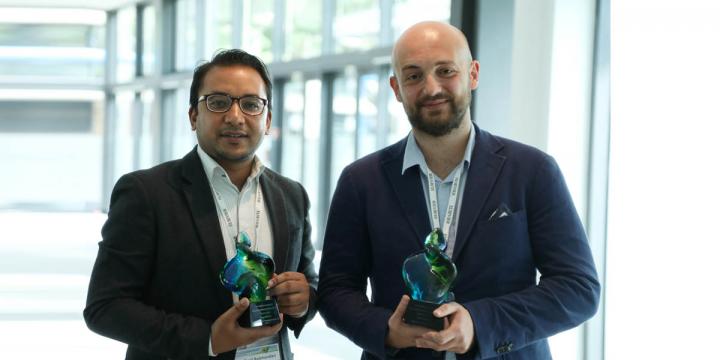The project of Prajwal Rajbhandari, President of the Research Institute for Biosciences & Biotechnology in Nepal came in first for the Elsevier Foundation Green and Sustainable Chemistry Challenge. His project, “Guava leaves as natural preservatives for farmers of Nepal” uses guava leaves to combat food spoilage.
The second place was won by Dr. Alessio Adamiano; his project involves turning fish bones into phosphate-rich fertilizer.

The Backstory:
- The Elsevier Foundation Green and Sustainable Chemistry Challenge is a collaboration between the Elsevier Foundation and Elsevier’s chemistry journals.
- The selection process began with more than 500 submissions and the five finalists made their pitch during the Green and Sustainable Chemistry Conference in Berlin.
What they are saying:
- “We are proud to award two projects with immediate relevance for communities in developing countries,” said Professor Dr. Klaus Küemmerer, Chair of the Challenge’s scientific jury.
- “The top five proposals presented at this year’s Green and Sustainable Chemistry Conference were quite diverse and each of these projects could have been a winner,” said Rob van Daalen, Senior Publisher of Chemistry Journals at Elsevier. “Both winning projects are important and urgent, and they use local resources and local knowledge to improve the situation in their communities.”
The Details:
- The grant for Dr. Rajbhandari’s project was EUR €50,000. Dr. Rajbhandari used guava leaves to make water-based sprayable natural preservative which can be used to prevent produce from being spoiled. Since Nepal doesn’t have cold chain technology or non-toxic preservatives readily available, nearly one-third of Nepal’s produce gets spoiled before it reaches the market each year.
- His project if implemented effectively can be a huge help to make the produce last longer in the Nepali market.
- He says, “Winning the Challenge is more than I could dream of. I can now scale up the project, and work with local teams to turn it into a success.”
- Dr. Küemmerer, Chair of the Challenge’s scientific jury also said, “Using guava leaves as a natural preservative replaces toxic chemicals and can be easily implemented at a local level involving local people; directly allowing for the safe transport of fruits to the local market without any residues being dangerous for the consumer and the farmers.”
- Elsevier Foundation has awarded more than 100 grants to non-profit organizations that focus their work on innovations in health information, diversity in Science, Technology & Mathematics (STM), research in developing countries and technology for development.
Editor’s Recommendations
- Nepal Flying Labs Among Winners of the First Humanitarian AUVSI XCELLENCE Award
- Nepali-American wins Globally Acclaimed Young-Economist Award
- Nepali Entrepreneur Wins Facebook Social Entrepreneurship Award
The Latest
-
TechLekh Awards: Best Phones of 2025 in Nepal Winners!Ooooooooooh boy, what a year it was for smartphones, even in Nepal! Phones have been…
-
TechLekh Awards: Best Tablets of 2025 in Nepal Winners!The smartphone scene in Nepal was absolutely crackling this year with constant new launches and…
-
TechLekh Awards: Best Scooters of 2025 in Nepal Winners!Scooters have played a major role in shaping everyday mobility in Nepal. They have always…
-
TechLekh Awards: Best Bikes of 2025 in Nepal Winners!Motorcycling in Nepal has always meant more than just getting from one place to another.…
-
TechLekh Awards: Best Cars of 2025 in Nepal Winners!Electric vehicles continue to dominate Nepal’s market in 2025, and Chinese manufacturers still lead the…
-
Benco Mobile Price in Nepal (February 2026 Updated)This is the complete list of Benco mobile price in Nepal for 2026. In this…
-
HMD Crest Max Price Increased by Rs. 1,000 in NepalHIGHLIGHTS HMD Crest Max 5G price in Nepal is Rs. 23,999 (8/256GB). This phone packs…
-
PRICE HIKE: HMD Crest 5G, Cheapest OLED Phone Just Got ExpensiveHIGHLIGHTS HMD Crest 5G price in Nepal is Rs. 19,999 (6/128GB). This phone packs the…













